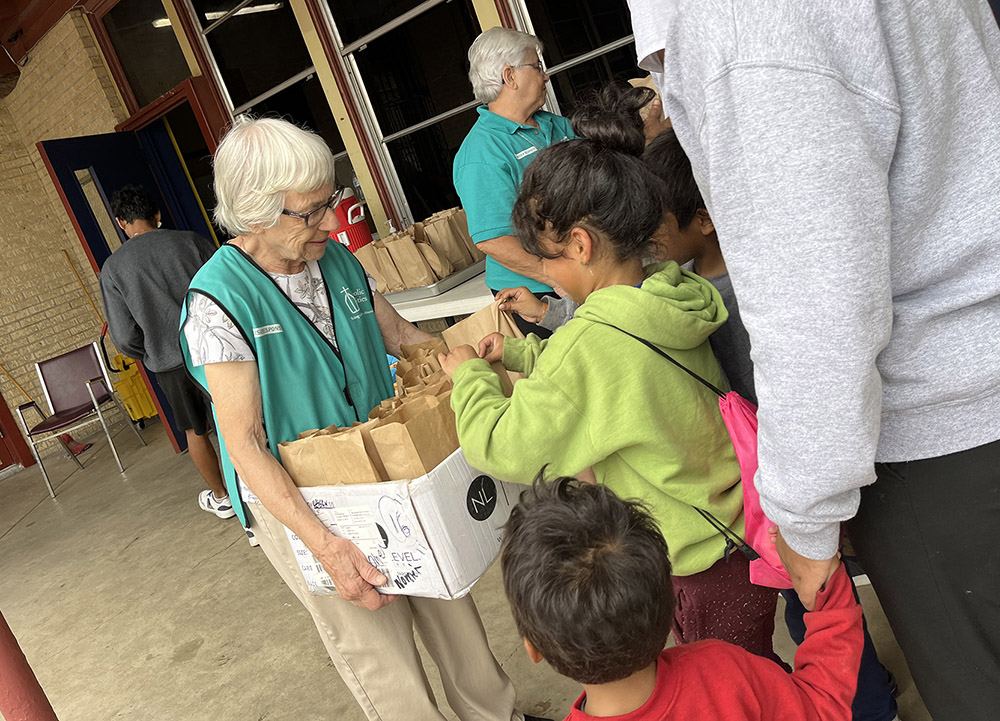
Notre Dame Sr. Roseanna Mellert and others hand out food to migrants at La Frontera's annex in Laredo, Texas. (Luis Donaldo Gonzalez)
Juana left Venezuela about a month ago with her husband and son, braving the jungles of the Darién Gap between Colombia and Panama with the hopes of escaping criminal gangs in their country. Finally, they reached Mexico’s border with the United States.
"When we arrived in the border town of Matamoros, we crossed the river ourselves on mattresses," said Juana, whose name has been changed.
After turning themselves in to U.S. Border Patrol in Brownsville, Texas, she and her husband were separated when they were taken to a detention center. They were later reunited.
Authorities then brought them to the border town of Laredo, Texas, where they stay in a migrant shelter that the local Catholic Charities runs and where Sisters of Notre Dame have been volunteering.
"We have spent a lot of money along the way, but we intend to get to Colorado, where our relatives are waiting for us and where we will have a hearing with a judge there in a month," Juana told Global Sisters Report in La Frontera, the migrant shelter. "Thank God we are alive and safe from people who do evil, both in our homeland and those along the way here."
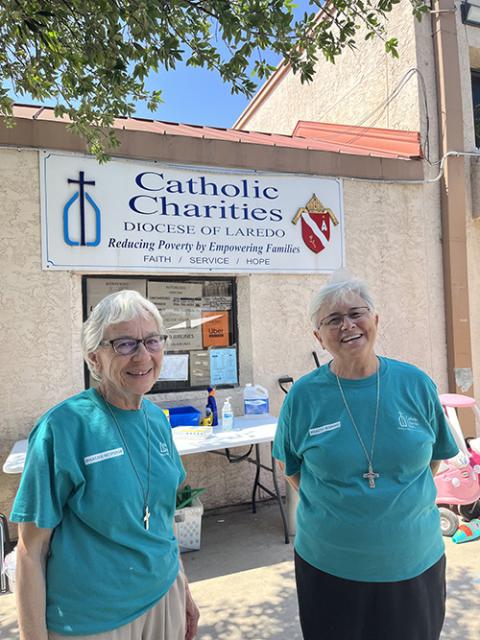
Notre Dame Srs. Roseanna Mellert and Joyce Bates at La Frontera, a migrant shelter of Catholic Charities of the Diocese of Laredo, Texas (Luis Donaldo Gonzalez)
Notre Dame Srs. Joyce Bates and Roseanna Mellert, who came from Ohio to volunteer at La Frontera in September 2022, hear stories like Juana's every day.
"In this shelter, we offer our guests what they need to rest, and we prepare them to be able to send them to their destination in the United States," Mellert told GSR. "They have already traveled a long way and suffered a lot because of the road and the cartels."
But the May 11 termination of Title 42 — a 2020 public health order that cited the coronavirus pandemic to restrict immigration and asylum — had generated uncertainty along the border, both for migrants and the shelters that accommodate them.
"Although the immigration restrictions changed a few days ago, we have had an overpopulation of migrants since the end of April, as people have wanted to cross the border before the change," Bates said.
Staff and volunteers at La Frontera planned a strategy for an expected influx in May, when the shelter exceeded its 130-guest capacity; overcrowding sparked the need for a 150-cot annex to be improvised in one of the nearby parishes of the Laredo Diocese.
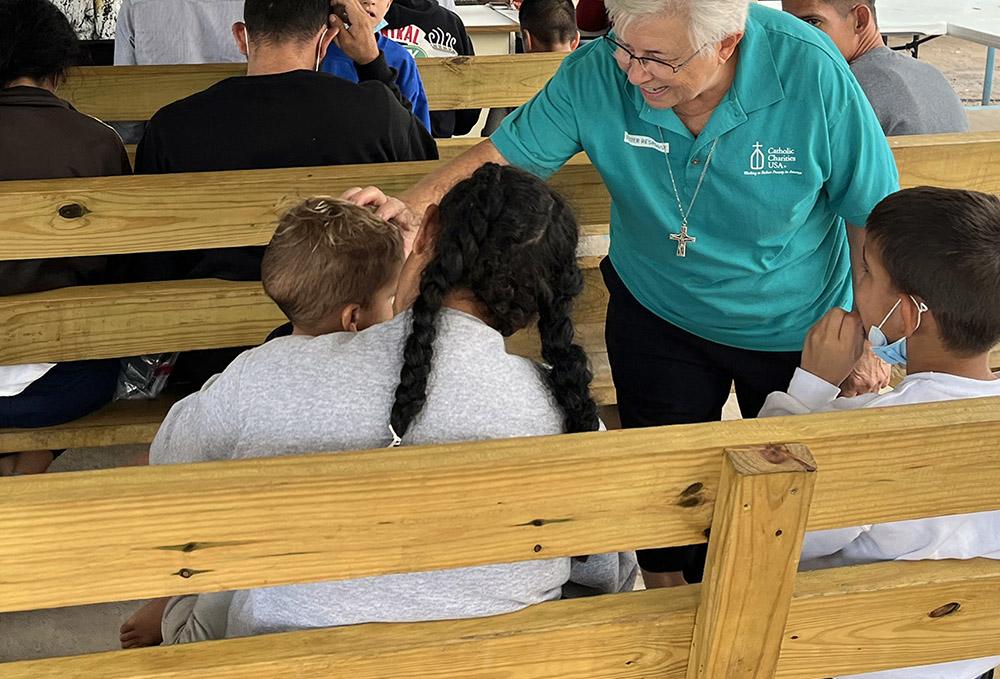
Notre Dame Sr. Joyce Bates welcomes new guests at La Frontera in Laredo, Texas, in the days following the expiration of Title 42. (Luis Donaldo Gonzalez)
"Between the two buildings, we are receiving and assisting around 200 and 300 people daily," Bates said. "We can say this is a humanitarian crisis, and the hardest thing for us right now is that we are running out of supplies."
Thanks to Catholic Charities funds, all migrants who arrive at La Frontera are provided with clothing, shoes, hot meals, showers, a night or two of lodging, and travel bags. They also receive the necessary orientation or assistance to help them reach their destination in the U.S.
The migrants arriving at the shelter have either been sent from the immigration authorities' detention and processing centers or have crossed legally through CBP One, the mobile application that allows asylum seekers to make an appointment with a U.S. immigration officer before leaving their homeland. All of La Frontera's guests, therefore, have provisional legal status in the country, and everyone is free to stay at the shelter or leave.
Advertisement
In spite of the overcrowding, none of the migrants appear unwashed or with torn clothes, thanks to the attention they receive from staff. With order and patience, they try to understand all the indications that the sisters and staff give them as they organize their journeys to their final destination in the U.S.
Children, meanwhile, keep themselves busy enjoying toys and playing basketball in the inner courtyard.
In the last few months, La Frontera has received people from Guatemala, Nicaragua, Colombia, Ecuador, Cuba, Ukraine, Russia and China. However, about nine out of 10 of the current guests are — like Juana and her family — coming from Venezuela.
"We are here to work closely with the migrants because it's easy to say, 'I'll give some money' or 'I'm gonna send my clothes,' " Mellert said. "But one big thing that you can do is welcome the people that are a little different from [who] we are."
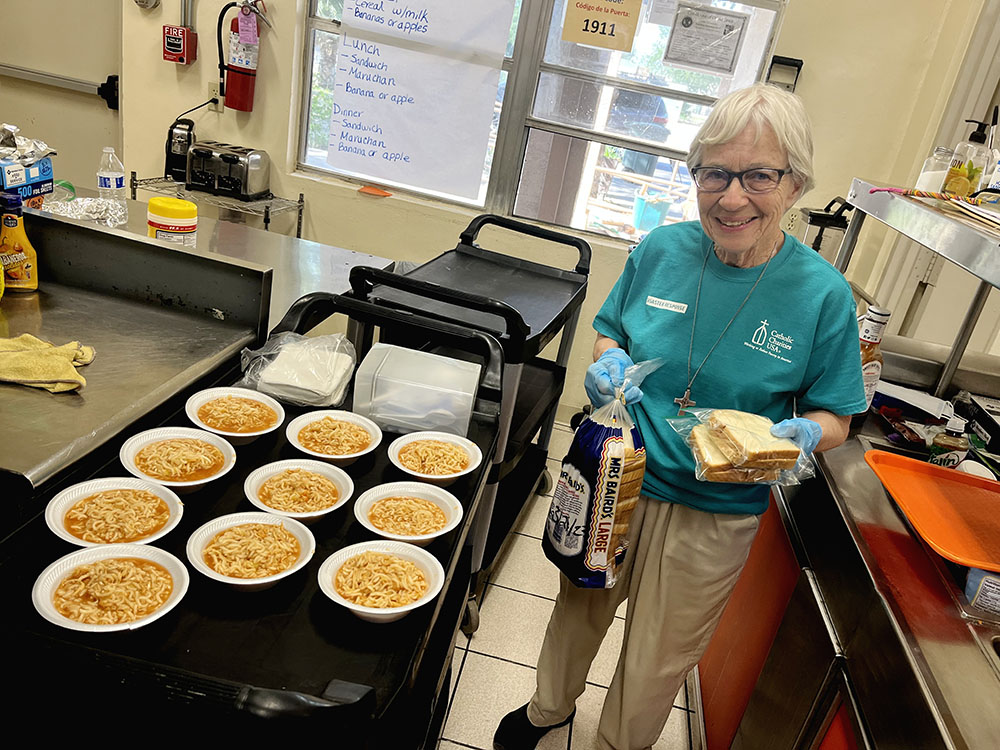
Originally from Chardon, Ohio, Notre Dame Sr. Roseanna Mellert previously served in Spanish-speaking countries such as the Dominican Republic and Nicaragua. (Luis Donaldo González)
The presence of the Sisters of Notre Dame in Laredo has brought multiple volunteers of different ages and locations. "We turned our house into a home for volunteers where we welcome individuals willing to work for migrants on this border," Bates said. "We have called it Casa de Hospitalidad [House of Hospitality]. We give them lodging and transportation so that they don't have high personal expenses as they volunteer."
For Lyla Summers, who is originally from St. Louis and participates in the sisters' volunteer program, coming to La Frontera has allowed her to learn about the migration situation, connect with a direct helpline for migrants and be part of a fundamental change in society, she said.
Sandy Ramirez, director of La Frontera, said, "The sisters' work energizes us." She applauded their energy and joy that carries them through the day.
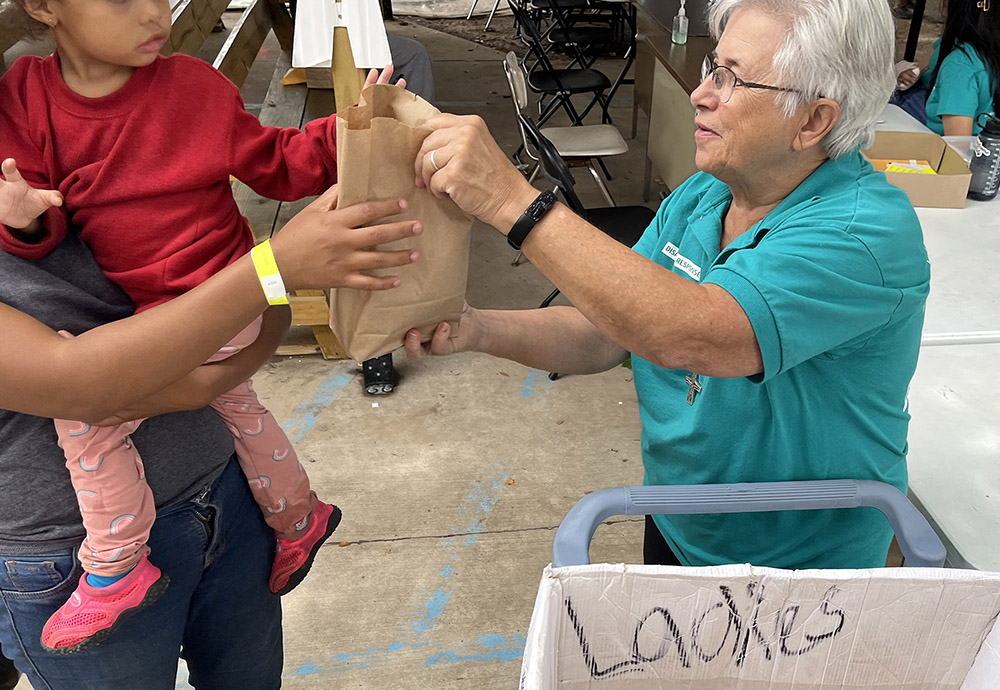
Before volunteering at La Frontera, Notre Dame Sr. Joyce Bates, originally from Toledo, Ohio, held ministries in education, children’s homes and nonprofit organizations, among others. (Luis Donaldo Gonzalez)
"We are here because we know that people are forced to leave the country that they love due to environmental reasons, wars, famine, or gang violence," Bates said. "Jesus reminds us to welcome the stranger."
The collaborative work of Catholic Charities of the Laredo Diocese and the Sisters of Notre Dame makes it possible for hundreds of people a day to find relief and human care, including for people like Mario, who left his home country of Cuba before traveling to Nicaragua and heading to the U.S.
"A few hours ago, I arrived at the shelter with my family," said Mario, who requested his name be changed. With the help of the sisters, he said, he hopes to reach Florida and reunite with family members.
"After five or six weeks of travel and danger, we feel safe today."







